Climate change: “It’s up to us”
11 Nov 2024
What needs to happen to stop global warming? LMU researchers address the most pressing questions.
11 Nov 2024
What needs to happen to stop global warming? LMU researchers address the most pressing questions.
The United Nations Climate Change Conference is taking place in Baku from 11 to 22 November 2024. LMU scientists from various disciplines illuminate the most important challenges from their perspective – from reducing CO2 emissions to expanding coral protection zones to improving early warning systems for coastal cities:
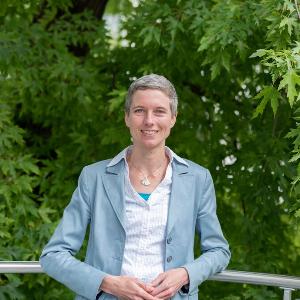
Prof. Dr. Julia Pongratz is investigating the effects of land use on the carbon cycle. | © LMU
“Swift and massive expansion of climate action measures is vital if we’re to reach our targets under the Paris Agreement. The signatories to the treaty will be carrying out important negotiations on these issues in Baku. In a few months, they have to publish their new national climate action plans – currently, however, these undertakings lead to a reduction in emissions of only four to ten percent by 2030 compared to 2019 levels.
As we calculate in the UN Emissions Gap Report this is not nearly enough. To limit global warming to 1.5°C, we need to reduce greenhouse gases by no less than 42 percent by that date. If countries do not quickly become much more ambitious, the world will be on course for a temperature rise of 2.6 to 3.1°C. This can lead to irreversible damage to ecosystems and endanger the means of subsistence of future generations.
To not jeopardize our climate targets, we also need methods for removing carbon dioxide from the atmosphere. In the CDRterra research program, we’re investigating the potential and risk of such approaches. At international conferences like COP29, moreover, science enters into dialog with politics, business, and society. This is essential to allow decision-makers in these spheres to make fact-based decisions.”
Prof. Dr Julia Pongratz is Chair of Physical Geography and Land Use Systems at LMU.
For the Multimedia-Story, see: Working the land to save the climate
Prof. Pongratz also is engaged in the Global Carbon Project.
To not jeopardize our climate targets, we also need methods for removing carbon dioxide from the atmosphere.Prof. Dr. Julia Pongratz, Chair of Physical Geography and Land Use Systems at LMU
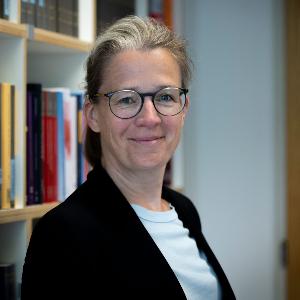
Prof. Dr. Ann-Katrin Kaufhold researches the question of which institutions are suitable for effective climate protection. | © LMU
Which institutions need to act quicker now to realize climate adaptations?
“The central institution remains the parliament, including for climate action and adaptation. The fundamental social change we so urgently need can only proceed from parliaments. Courts, central banks, scientific bodies, committees, and administrative agencies – they can all join in and lend support. They can remind parliaments of their responsibilities, and in some cases they can exercise powerful levers to get adaptations implemented. But in a democracy, no institution can supplant parliaments as the engine of social change.
Parliaments must set the direction of travel and determine the speed. In view of the snail’s pace at which projects of social-ecological transformation can progress at times, this can be highly frustrating for sure. But it also means: Everybody can influence through their voting decisions how quickly we make progress in what areas. This is how it must be in a democracy – it’s up to us.”
Prof. Dr. Ann-Katrin Kaufhold is Professor of Constitutional and Administrative Law at LMU.
Interview: Climate: Who can fix it?
The central institution remains the parliament, including for climate action and adaptation.Prof. Dr. Ann-Katrin Kaufhold, Chair of Constitutional and Administrative Law at LMU
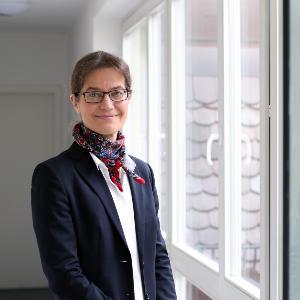
Prof. Dr. Karen Pittel is an expert for climate change and energy. | © ifo Institut
“In light of geopolitical developments, the UN climate conferences (COP) are even more important today than in the past. They offer a forum for all countries to come together and advance the cause of climate action. In times of growing skepticism toward multilateralism, the need for international cooperation over climate action has become even more pressing.
The challenges of climate change require collective action that holds rich countries to account while not neglecting poor ones. High income countries must work together so that emissions are not simply shifted elsewhere and also address concerns concerning the effects of climate action on their competitiveness.
At the same time, rich countries must support poorer countries and help them with their climate action and adaptation efforts. In addition to financial assistance, this should include technology transfer and the exchange of knowledge. Although progress was made in this regard at previous climate conferences, existing measures are a long way shy of what is needed. The clock is ticking: To achieve the goal of climate neutrality by the middle of the century, we need to act now. Cooperation between nations is not just desirable to this end, but essential.”
Prof. Dr. Karen Pittel is Professor of Economics, esp. Energy, Climate, and Exhaustible Natural Resources, at LMU’s Faculty of Economics and Director of the ifo Center for Energy, Climate, and Resources.
Interview with Karen Pittel (dating 2022): “The energy scarcity today could lead to a surfeit of fossil fuel later”
The challenges of climate change require collective action that holds rich countries to account while not neglecting poor ones.Prof. Dr. Karen Pittel, Professor of Economics, esp. Energy, Climate, and Exhaustible Natural Resources, at LMU’s Faculty of Economics and Director of the ifo Center for Energy, Climate, and Resources.
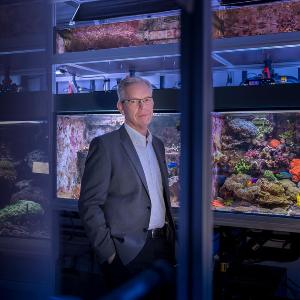
Prof. Dr. Gert Wörheide researches the effects of climate change on the oceans. | © LMU
"Immediate, comprehensive measures are needed to save biodiversity in the oceans and especially in coral reefs. Firstly, global greenhouse gas emissions must be drastically reduced, as ocean warming is the main cause of coral death due to coral bleaching. Rapidly advancing the energy transition and meeting the goals of the Paris Agreement are therefore key.
Secondly, protected areas must be massively expanded to protect sensitive marine ecosystems from overfishing, pollution, plastic waste, and destructive fishing methods. Improving water quality, particularly in coastal regions, by reducing nutrient inputs from agriculture is also essential.
Thirdly, research and funding for the restoration and adaptation of coral reefs should be strengthened in order to promote resistant coral species. The UN Climate Change Conference provides the stage to finally create binding international agreements that focus on these measures. Without immediate action, there is a risk of irreversible loss of marine biodiversity and their ecosystem services."
Prof. Dr. Gert Wörheide is Chair of Palaeontology & Geobiology, Department of Earth and Environmental Sciences.
Interview: All eyes on the ocean
Without immediate action, there is a risk of irreversible loss of marine biodiversity and their ecosystem services.Prof. Dr. Gert Wörheide, Chair of Palaeontology & Geobiology, Department of Earth and Environmental Sciences
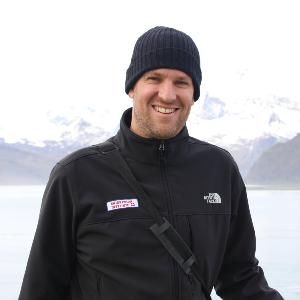
Prof. Dr. Alexander Haumann is investigating how the ocean and polar regions are changing as a result of climate change. | © Alexander Haumann
“The global ocean is the life insurance of our planet. Over the past decades, it has massively reduced human-caused climate change by absorbing 91% of the excess heat in the Earth system and 26% of human-induced carbon emissions. In this way, it has greatly slowed down global surface warming. However, this service comes at a high cost: The ocean is acidifying, which poses a threat to ecosystems and ocean biodiversity; and the ocean is overheating, which leads to oxygen depletion, sea level rise, and an increase in extreme events. The latter include droughts, forest fires, and flooding, which are already becoming more frequent and will become even more frequent in the future.
In addition to the warming of the ocean, stronger winds, the melting of polar ice masses, and an intensification of the water cycle are leading to changes in ocean circulation and mixing. This affects how the ocean is able to slow climate change, and it increases the risk of reaching tipping points in the system, which can lead to massive changes in climate. Such events are known to have happened in the Earth’s history and are likely caused by changes in ocean circulation and mixing.
To this day, many regions and processes in the ocean have not been sufficiently researched, which leads to uncertainties in projections with climate models. To improve these models, we need new and more comprehensive measuring methods and systems that enable us to continuously monitor even hard-to-access regions of the ocean. Increased international scientific cooperation, such as the efforts being implemented in the UN Ocean Decade (2021-2030), and technological advances are making such observation systems possible, which will make future changes and potential risks more predictable.
Independent of scientific progress in better understanding the ocean and its influence on the climate of the Earth, the risks and consequences of climate change associated with oceanic changes can only be limited by immediately stopping greenhouse gas emissions.”
Prof. Dr. Alexander Haumann is Professor of Physical Geography with a Focus on Oceanography at LMU.
To this day, many regions and processes in the ocean have not been sufficiently researched, which leads to uncertainties in projections with climate models.Prof. Dr. Alexander Haumann
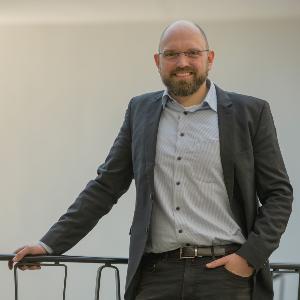
Prof. Dr. Matthias Garschagen is investigating, in particular, how urban societies can adapt to climate change. | © LMU
What is most urgent to save coastal cities from ruin?
"Coastal cities face a particularly high exposure to climate hazards such as intensifying storms and hence need to engage in swift and comprehensive adaptation action. Around the globe, such cities have therefore begun to develop and test adaptation measures such as upgraded coastal protection infrastructure or improved early warning systems.
However, recent studies show that most of the cities are not adapting quickly enough. Measured against the fact that the adaptation of hard, green and social infrastructure often has long lead-times, and that climate change is unfolding rapidly, the planning, negotiation and implementation of adaptation measures needs to be accelerated. In addition, adaptation needs to be considered in a more transformative way, acknowledging also its limits. For example, societies increasingly need to ask, whether the protection of their most exposed coastal and urban areas becomes too expansive or reaches its technical limits – and when to engage in the planned relocation of buildings and infrastructure. "
Prof. Dr. Matthias Garschagen is Chair in Human Geography with a Focus on Human Environment Relations at LMU.
For the interview: “We’re running out of time”
Coastal cities face a particularly high exposure to climate hazards such as intensifying storms and hence need to engage in swift and comprehensive adaptation action.Prof. Dr. Matthias Garschagen , Chair in Human Geography with a Focus on Human Environment Relations
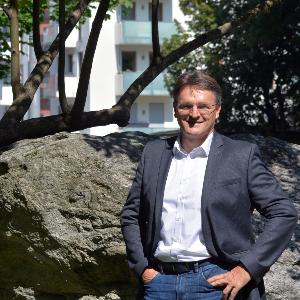
Prof. Dr. Ralf Ludwig conducts research into the consequences of climate change, particularly with regard to the management of water resources. | © LMU
“The frequency and intensity of extreme events – sadly, very topical now in France and Spain – underscores how we in Germany also need to prepare for greater and new risks. This starts with the necessity to rethink our current ways of measuring extreme events and adapt them to highly dynamic changes.
To increase Germany’s resilience against extreme weather events, we need a multilayered approach. The implementation of natural-based solutions to support climate-change-resilient landscape water balance – for example, by restoring moors and floodplains – is a key task here. Improving urban infiltration areas and the use of “sponge city” concepts can also improve local water absorption.
Moreover, we should adapt agricultural practices through means such as soil improvement strategies like agroforestry and regenerative agriculture in order to increase water retention capacities and reduce soil erosion. As well as adapting water-management infrastructure and getting it into shape, we need integrative early warning systems to reduce vulnerability and optimize adaptation strategies.”
Prof. Dr. Ralf Ludwig is Professor for Applied Physical Geography and Environmental Modeling at LMU.
The frequency and intensity of extreme events – sadly, very topical now in France and Spain – underscores how we in Germany also need to prepare for greater and new risks.Prof. Dr. Ralf Ludwig , Professor for Applied Physical Geography and Environmental Modeling at LMU.
For the Interview, see: “We must learn to get by with less water”

Prof. Dr. Lars Guenther researches crisis and risk communication. | © Jan Greune
How should the climate be covered differently so that action is taken more quickly and policies are supported?
"Our analyses, which we frequently conduct internationally (e.g., Germany, India, South Africa, USA) and for various media (e.g., news magazines, daily newspapers), show that climate reporting often occurs in the context of distant, global, and negative—sometimes even apocalyptic—future scenarios. Climate change is portrayed as an abstract problem, mentioning representatives from science and politics. Media coverage like this does not resonate with many people.
Research shows that such representations may capture public attention but do not necessarily motivate action. Although the research findings are not conclusive, there is evidence suggesting that presenting climate change in more immediate, local contexts, with references to everyday life and individual as well as collective solutions, can increase the willingness to adopt climate-friendly behaviors and support related measures."
Prof. Dr. Lars Guenther is Professor of Communication Science at LMU
There is evidence suggesting that presenting climate change in more immediate, local contexts, with references to everyday life and individual as well as collective solutions, can increase the willingness to adopt climate-friendly behaviors and support related measures.Prof. Dr. Lars Guenther, Professor of communication science
29 Oct 2024